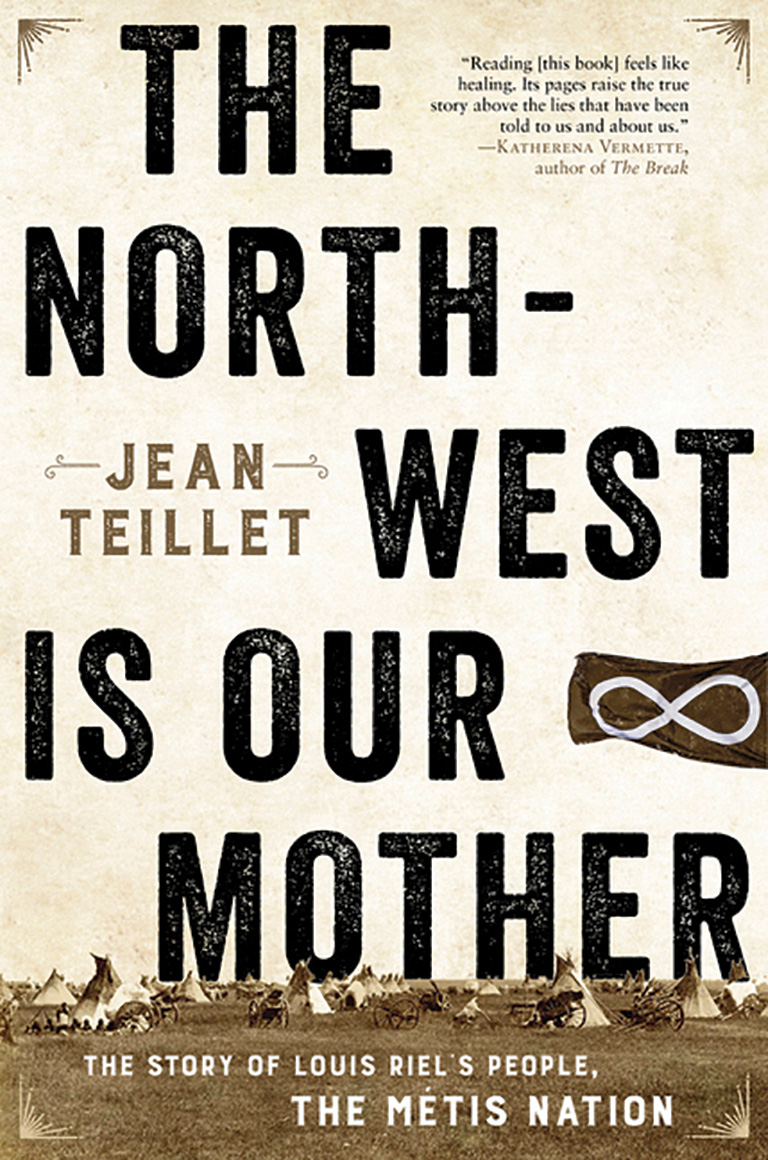The North-West Is Our Mother

The North-West Is Our Mother: The Story of Louis Riel’s People, the Métis Nation
by Jean Teillet
Patrick Crean Editions,
590 pages, $36.99
Imagine if your story — the story of your family, your people, your culture — was often told by someone else. Imagine further that some of these outsiders were tale-twisters, spinmeisters, propagandists, racists, many of them with underlying imperialist motives. Now pull this flawed narrative forward and embed it into the story of Canada; muddle it even more, so that some modern day Canadians with no arterial connection to your nation or homeland either dismiss and malign you or reimagine — and insert themselves into — your people’s history. Such is the story of the Métis Nation that Jean Teillet’s The North-West Is Our Mother seeks to set straight.
At more than five hundred pages, the book’s length makes it appear like one of the many tomes that have explored Métis history with an academic lens. But the stylistically hand-drawn map of the North-West, the Métis homeland, on the book’s inside front cover tells readers that they are in for a different approach — a fireside chat, rather than a didactic lecture.
Teillet, a lawyer, lecturer, and great-grandniece of Louis Riel, begins in the late 1790s with the generation that will become the founders of the Métis Nation and ends in the present day, highlighting the current struggles the Métis face: reconciliation, recognition, resources, and the newest among them, race shifting, which involves white people claiming Métis identity.
Interwoven throughout the narrative are the movers and shakers of Métis history: Jean-Baptise Lagimodière, Cuthbert Grant, Louis Riel, Gabriel Dumont, Jim Brady, and Malcolm Norris. Teillet writes, “This book contains the best-known stories of the Métis Nation as well as some forgotten ones.” She shares the ubiquitous stories of often-silent yet dauntless voyageurs, fierce nomadic buffalo hunters, Métis bards and balladeers, and the indomitable Métis women.
Teillet’s story of the Métis is framed around five resistances, which are set against the backdrop of events leading up to the creation of the Canadian state: the First National Resistance against Lord Selkirk and his settlers, where she highlights the birth of the Métis Nation at the Battle of Frog Plain in 1816; the Second National Resistance, a “cry for freedom” against the goliath Hudson’s Bay Company; the Third National Resistance against Canada — more particularly, against Orangeist Ontarians seeking the spoils of the West — and the resultant Red River Resistance; the Fourth National Resistance, or “La Guerre Nationale,” in 1885 at Batoche; and the Fifth National Resistance, a Métis collective renaissance in opposition to the Canadian government.
She upends the typical historiography surrounding chronicles of the Métis by relying not only on historical and anthropological records but on her own family history and the rich oral tradition of the Métis. Teillet intentionally employs Métis terminology (differentiating between a voyageur and a Freeman — an independent hunter-trader), toponyms (Frog Plain, not Seven Oaks), and names of historical events (the “reign of terror,” not the Red River Expeditionary Force), and she clearly identifies the Métis Nation’s homeland in words and in maps.
She does not pussyfoot when making statements such as “Lord Selkirk was a racist”; she is not Pollyannish when calling out the backroom duplicity of the Catholic Church; and she does not conceal the internal struggles within the Métis Nation itself.
The North-West Is Our Mother embodies the heart of Métis storytelling — and, like her Métis forebears, Teillet is a seasoned raconteur. In her book, she builds a story of a people born of the plains and levered by kinship, resistance, a stalwart sense of identity, and the “belief that their past battles, celebrated in their stories and songs, will eventually enable a future where they will be free to be the nation of their dreams, the one they first sang into being in 1816.”
The North-West Is Our Mother is not only a paean to the genesis and survival of the Métis Nation but also a bellwether for reconciliation in twenty-first-century Canada.
Themes associated with this article
Advertisement




